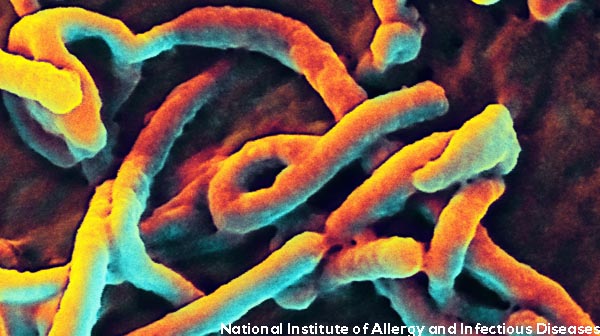
JMH: One question that I am sure our readers will want to know is, “When are patients infectious?”
Explore This Issue
ACEP Now: Vol 33 – No 11 – November 2014TU: While symptomatic individuals are considered infectious, it is clear that the sicker you are, the greater the viremia. So someone with mild initial symptoms within the first 72 hours of clinical disease could have a blood specimen collected that tests negative for Ebola virus with real-time reverse transcription polymerase chain reaction (RT-PCR). Therefore, if clinical suspicion remains high for Ebola virus disease, it is important to retest symptomatic individuals after 72 hours from illness onset. There is a correlation between the level of viremia and clinical severity. Persons with Ebola virus disease will become progressively worse with higher levels of Ebola virus in their blood, and clinical recovery is correlated with decreasing viremia.
JMH: Along with the concerns about the potential for spread, what should our members do to protect themselves, staff, and other patients?
TU: The discussions and concerns related to personal protective equipment (PPE) are very real issues for health care workers. Based upon the most recent cases, we have updated the specific instructions for PPE. It is important to wear the appropriate PPE and to make sure that donning and doffing the gear is done correctly. Health care workers caring for suspected or confirmed Ebola virus disease patients should have no skin exposure. I would recommend visiting the CDC website for the most up-to-date information. In brief, rapid identification and isolation of suspected cases is important, with implementation of recommended PPE and infection control precautions. Ebola virus is transmitted by direct exposure to blood and bodily secretions (vomit, stool, urine) of a symptomatic patient with Ebola virus disease. Ebola virus disease is not a respiratory illness but a systemic disease with multiorgan infection that triggers a host inflammatory response. This is in contrast to respiratory diseases caused by rare infections such as MERS-CoV and very common infections due to influenza A and B viruses. Work with your hospital infection control to be sure you have an up-to-date response plan.
JMH: Any concluding thoughts or recommendations?
TU: The travel history is extremely important. However, it is critical to remember that the vast majority of sick individuals with fever who have traveled recently from West Africa do not have Ebola virus disease. Also, the most-affected countries are Sierra Leone, Liberia, and Guinea, not all of West Africa or sub-Saharan Africa. In fact, the most common diagnosis in a returned traveler with fever from West Africa is malaria. Another diagnosis to consider is typhoid fever. In all the excitement and anxiety about Ebola, be sure to consider more-likely causes of fever, including common community-acquired pathogens in the United States, depending upon how long the person has been back in the United States. Another key point is to take a detailed history of the timeline and progression of clinical signs and symptoms. Even though the initial signs and symptoms of Ebola virus disease are nonspecific, understanding the progression of symptoms can help point to other etiologies. For example, vomiting and diarrhea do not typically occur until about four to five days after illness onset in Ebola virus disease—therefore, a patient who presents with fever and diarrhea occurring at illness onset is very unlikely to have Ebola virus disease.
Pages: 1 2 3 4 | Single Page



2 Responses to “CDC Ebola Expert Tim Uyeki, MD, MPH, Offers Ebola Management and Safety Information”
September 22, 2015
Ebola Drug Gets FDA Fast Track Status - ACEP Now[…] said on Sept. 17 that the U.S. Food and Drug Administration (FDA) granted fast track status to its Ebola drug ZMapp. The FDA grants the status to drugs intended to treat serious conditions that have few […]
October 15, 2015
Johnson & Johnson Begins Ebola Vaccine Trials in Sierra Leone - ACEP Now[…] & Johnson (J&J) has begun a clinical trial of a two-shot Ebola vaccine in Sierra Leone, underlining its determination to push ahead with development, even as the […]